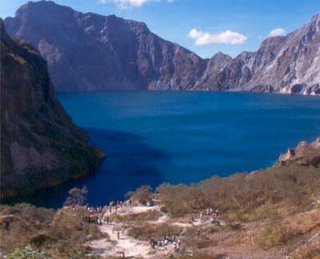DOT questions Korean road work in Pinatubo
 A Department of Tourism official on Monday has denounced a Korean company that he claimed carved a 20-km road leading to the crater of Mt. Pinatubo, a World Tourism Organization-recognized site, without a permit from any government agency.
A Department of Tourism official on Monday has denounced a Korean company that he claimed carved a 20-km road leading to the crater of Mt. Pinatubo, a World Tourism Organization-recognized site, without a permit from any government agency.In a travel advisory posted on Monday, Ronaldo Tiotuico, DOT Central Luzon director, said his office has “vigorously registered its strong and unequivocal objection” to the road project by the PDC Development Corp. (PDCDC). The road runs from Capas, Tarlac, to Botolan, Zambales.
The firm was the first private company to have invested in the area, running the Mt. Pinatubo Spa Town in Barangay Sta. Juliana, the nearest gateway to the volcano that last erupted in June 1991. The company also offers tours to the volcano, which the Aetas and the DOT began in 1994.
In a phone interview, Tiotuico said he learned of the new trail only through the Sta. Juliana tourism council.
“I would not have allowed it if I had learned of this project from the start,” he said.
Aside from not coordinating with the DOT, the company did not obtain an environmental compliance certificate (ECC) from the Department of Environment and Natural Resources or a free and prior informed consent certificate (FPIC) from the National Commission on Indigenous Peoples, Tiotuico said.
Cris Park, PDCDC president, said the project was approved by Mayor Reynaldo Catacutan and the Capas town council.
“We built the road to provide development in the area,” Park said when reached through his mobile phone.
Park, who said he was unaware of Tiotuico’s complaint, said he would coordinate with Tourism Secretary Joseph Ace Durano to answer the allegations.
Park threatened to close shop because of Tiotuico’s non-cooperation.
“I cannot understand him. He was not helping us,” he said.
Francisco Villena Jr., the company’s operations chief, said the trail merely revived an old logging road in the area. Villena confirmed the “minimal side-cutting” of hills to restore the road but denied that the entire stretch or any portion of it was concreted or bulldozed.
According to Villena, this route allows tourists to reach the crater in just 30 or 40 minutes. He said the regular route via the O’Donnell River in Crow Valley takes about seven hours to hurdle.
Catacutan said he and other local officials initiated the road project to boost the town’s tourism program.
He said PDCDC did not need a DENR permit because what was rehabilitated was an old road built by the United States Air Force that maintained a radar and training station at Crow Valley.

“We just removed big boulders and [some] trees in the path. The soil is stable,” Catacutan said.
The mayor said local NCIP representatives and the heirs of Don Antonio Aquino, among them former vice presidential candidate Hermie Aquino, gave consent to the project. The Aquinos own the land traversed by the project.
The Philippine Air Force, which has jurisdiction over the area, has been consulted, Catacutan said.
Tourism-related activities, he said, have helped the Aetas and upland farmers in Capas cope with the effects of Mt. Pinatubo’s eruption. By Tonette Orejas - Inquirer







0 Comments:
Post a Comment
<< Home